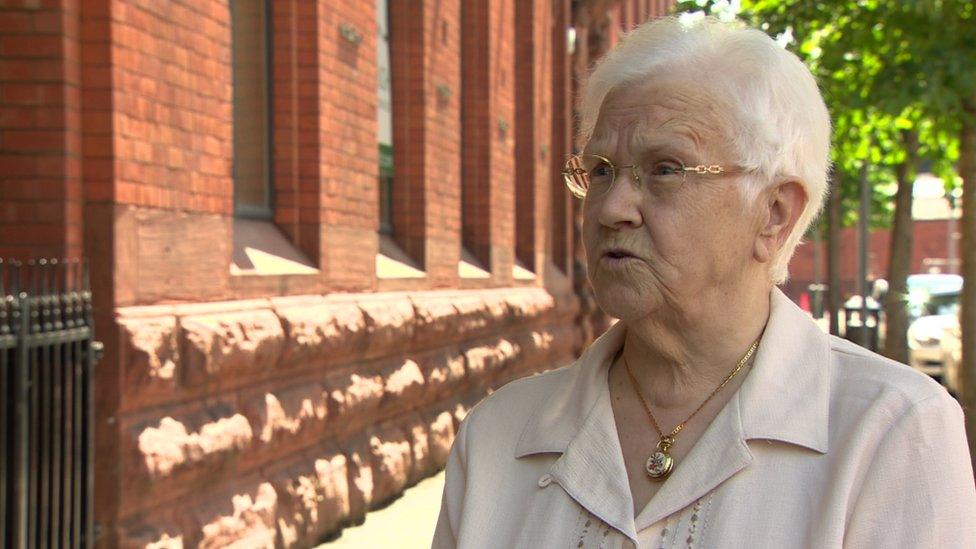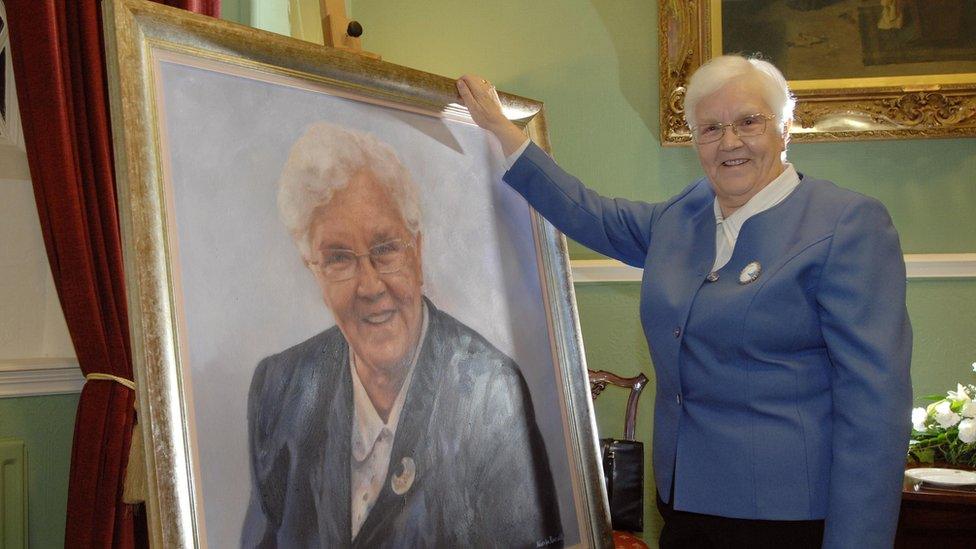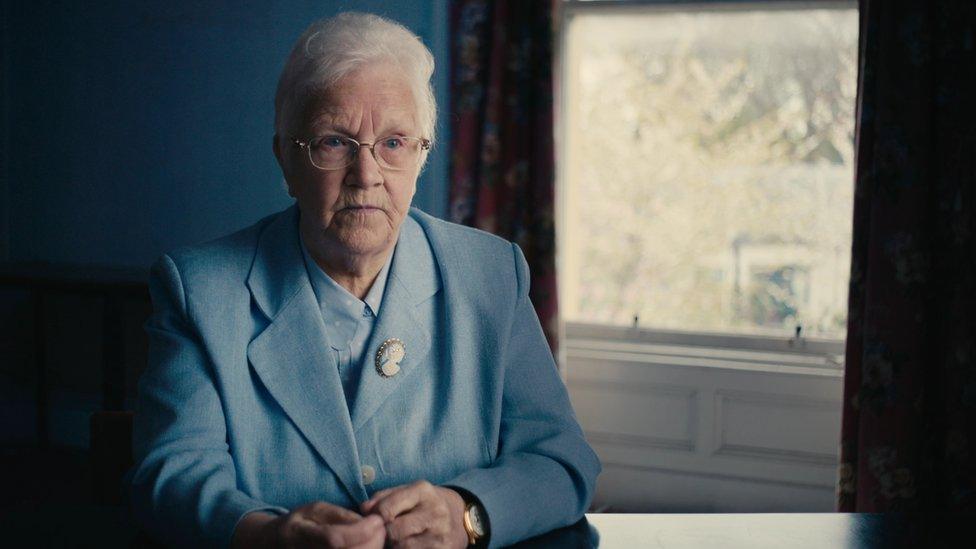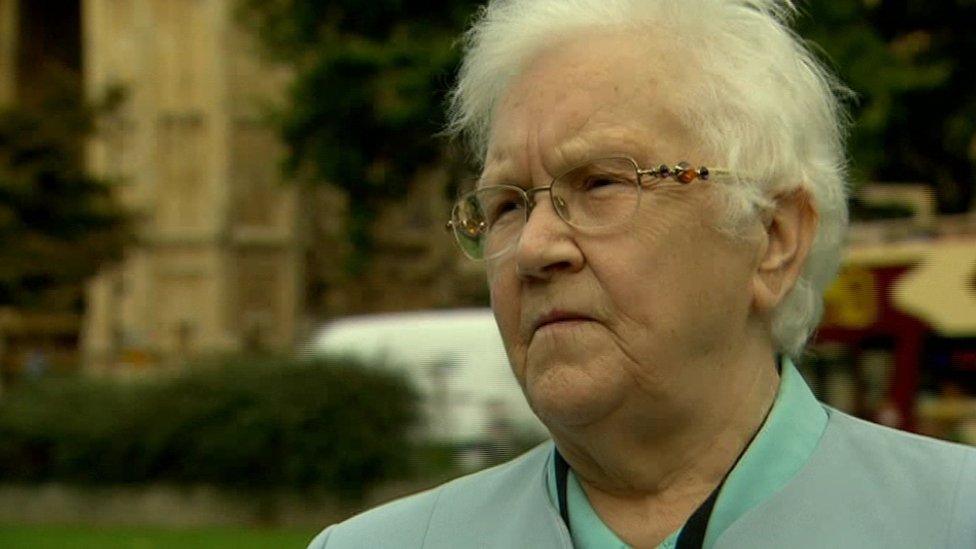May Blood: Trade unionist and former Labour peer dies aged 84
- Published

Baroness Blood stepped down from the House of Lords in 2018
Former Labour peer and trade unionist Baroness Blood has died, aged 84.
The Belfast woman was the president of the Labour Party in Northern Ireland and was previously involved with the Northern Ireland Women's Coalition.
She began work at 14 in the Blackstaff Linen Mill in west Belfast.
After the closure of the mill, she ran a training project for long-term unemployed men in the Shankill Road area and from 1993 to 1999 worked for the Greater Shankill Partnership.
In 1999 she became the first woman in Northern Ireland to be given a life peerage, taking the title Baroness Blood of Blackwatertown.
Politicians have paid tribute to her for her activism for working class communities.
Democratic Unionist Party (DUP) leader Sir Jeffrey Donaldson said she was a "fearless and tireless campaigner" who focused on making people's lives better.
Sinn Féin vice-president Michelle O'Neill said Baroness Blood was a "committed community and trade union activist" who always stood up for workers and families.
"She never gave up on campaigning for equality and to secure fair pay and conditions for people in the workplace", she said.
SDLP leader Colum Eastwood described her as a "tireless community activist and advocate for workers to her core".

Baroness Blood was given a life peerage in 1999
Ulster Unionist Party (UUP) assembly member Mike Nesbitt said he first encountered Baroness Blood in the wake of the 1993 Shankill Road bombing.
"She was a force of nature, determined to ensure her community was recognised, helped and assisted," he said.
Irish President Michael D Higgins said she was a "truly progressive force" whose death "will be felt by so many".
During the 1970s, Baroness Blood actively supported campaigns for legislation for men and women to receive equal pay and for an end to sex discrimination.
Her other campaigns within Blackstaff Mill included battling to reduce working hours, negotiating for holiday pay and Saturday overtime rates, and campaigning for a minimum wage for the women working in the mill offices.
She was made an MBE in 1995 for her work on labour relations.
'Sad day'
In the 1990s Baroness Blood played a key role in the formation of the Northern Ireland Women's Coalition.
The political party played a significant role in the peace talks that led to the Good Friday Agreement in 1998.
Monica McWilliams, who co-founded the coalition, said she would "miss her dreadfully".
"It's a very sad day and although I knew she had been very ill it was still a shock," she told BBC Radio Ulster's Talkback programme.
"She's been part of my life for so many decades - first as a trade unionist, as an activist, as a member of the Women's Coalition, as a fighter for integrated education.
"A children's rights defender in terms of the work she did all the work she did for her community in the Shankill.
"Her political will will be missed greatly."
On receiving her place in the House of Lords, May Blood selected the title Baroness Blood of Blackwatertown.
Speaking to Talkback in 2016, she explained how her title was chosen.
"What did I know about creating a title?" she said.
"I wasn't allowed to ask anybody's advice because it was all secret - I really worried myself sick.
"If I knew I could have been called after Belfast I would have been proud to do it but I didn't know that."
At the time Baroness Blood believed she had been born beside the Blackwater River.
"When I saw it on the map - Blackwatertown, that'll do me."

Baroness Blood was an advocate for integrated education in Northern Ireland
She had in fact been born beside the Blackstaff River.
Baroness Blood said she was proud of the title even if it was rarely used.
"I'm the only Blood in the House of Lords so they can't mix me up with anybody," she said.
She represented the Labour Party until she stepped down from the House of Lords in 2018.
'Simply irreplaceable'
Baroness Blood was also involved with the Integrated Education Fund, which works for more schools where Protestant and Catholic children go to school together.
The fund said she "yearned to see Northern Ireland at peace and it was that desire for peace that drove her to do exceptional things for so many people".
It paid tribute to her, saying she was a great friend and champion.
Paul Caskey, head of campaigns at the fund, said: "She has left an amazing legacy and I would also say May Blood is simply irreplaceable.
"She was so proud of how the movement has grown, particularly in recent years," he said.
"She was so proud of the number of schools that were transforming to integrated status and that gave her great satisfaction."
Former professional boxer Carl Frampton, who worked alongside Baroness Blood as a patron of the Integrated Education Fund, also paid tribute to her.
Allow X content?
This article contains content provided by X. We ask for your permission before anything is loaded, as they may be using cookies and other technologies. You may want to read X’s cookie policy, external and privacy policy, external before accepting. To view this content choose ‘accept and continue’.
He posted on Twitter: "Her passion for integrated education won't be surpassed."
Related topics
- Published28 December 2016
